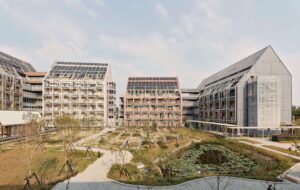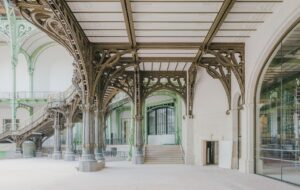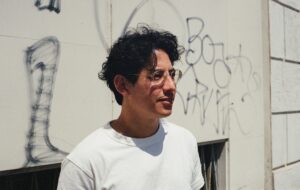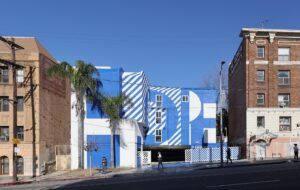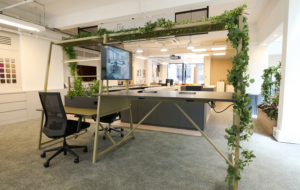
Brett Steele One of the defining aspects of the city is that you could easily call it one of the largest collections of creative individuals on the planet today. You can talk about pioneering individuals like Rem [Koolhaas] living here. The interesting thing is also that the status of design in the world has changed. We live in a world where Design 360 is every Sunday night on CNN. However brief and uninteresting that 30 seconds is, it acknowledges that that’s now a part of the world. Zaha has struggled for 20 years but now she’s a big business.
icon The history of recent Dutch or Spanish architecture, for example, can be characterised by forms of continuity. Why do you think London doesn’t have that?
bs London imports; it imports and perfects. One of the strongest traditions you could point to in English architecture is the legacy of what used to be called High Tech, which is born out of incredible engineering then brought to bear on building. It’s still an amazing body of work. My hunch is that High Tech has always been a uniquely English form of postmodernism. That to me is the one part of British architecture that isn’t imported. It’s home grown out of the relationship between commercial production and great engineering advances. Beyond that you can look at architecture as a thing that this country has been very good at importing. And when it imports it, it gets a strange twist.
icon What do you think the designs for the Olympics site say about London?
bs Something like the Olympics coming to London will have a dramatic effect on the city. Literally billions of pounds will be poured into a part of the city that could use a few billion pounds. But it’s for an event that happens for a two-week period in which the forms, symbols and icons of that enterprise are being shaped for and by the event and by how it’s projected televisually and viewed by a global audience. Our ability to make strong iconic structures for these mediated environments is actually pretty substantial. But it’s not defined by those of us [London residents] who won’t even be able to afford to get to east London by the time it happens. That’s the really complex side of it.
icon So you don’t think those projects deal with civic issues of representation and symbolism?
bs No, [the Olympics win] hasn’t favoured those sorts of things. And if it had, they would have been done without the Olympics because those issues would have been inevitable. That’s also what makes London so strange. Those issues are important to us because we happen to live here, but we’re the minority view. We’re 9 million people and 65 million come here for a week each year so it’s a more complex thing than that. These larger forces aren’t negative; they’re just different from the local ones. What London could become very good at is finding a way to negotiate those two.
An interesting point is that along with the Olympics and the bombings, the Congestion Charge nearly doubled that week [on 4 July the charge rose from £5 to £8]. It’s more expensive to get into the city than it once was to go to New Zealand! When museums became free, they started charging for the city. That’s when you knew England had reached the pinnacle of museum culture. London is a museum.
icon People are beginning to say that London is changing faster than any city in the world. Do you think we’re on the edge of one of these extreme moments?
bs I think we’re already in it. This city right now is the development of a completely different type of panopticon [a circular prison with a central watchtower] surveillance. There is no city like it in the world today. Even Manhattan – nothing can compete with the fact that everyone and everything here is photographed. The horrible side of that is that it’s already in place. You could argue that that’s a bigger infrastructure than metros or subways – another one of this country’s great inventions at the end of the 19th century. It’s a pretty big deal.
We had some students who were mapping the treadmill pattern of how Oxford Street is organised. Every two blocks you have the same combination of shoe stores, ATM machines and cameras. During that they found a surveillance headquarters and it was just horrible.
I have that American queasiness that somehow it’s a little spooky. It’s another example that we’re not waiting for the revolution to come; it’s more like, what are the kinds of events that make us realise that the world has changed? London is phenomenal for those kinds of infrastructures.
The ones that struck me before were the more physical ones for tourists. The conversion of the British Museum into a large lobby, for example. The tourist trade had reshaped the city. But the more amazing ones are the less visible ones, like these cameras. If you want to strike the difference between this city and any other, you have to look at that. I think it’s funny that in the country that invented the panopticon, a century later, instead of a large single eye you have a city of constant eyes.
icon What happened to you on the day of the bombings?
bs I had to cross over from the East End to decide what to do for the graduation ceremony, the stuff that was scheduled for the next day (the AA’s graduation day was on 8 July). Around Russell Square they were stopping people but we got through, so we sat down here and worked out a strategy for the next day.
icon How does it make you feel about the city?
bs It’s obviously a more complex issue now that we know more. It’s a horrible thing. You read through Blair’s statements on this and he’s also working through the implications that these are a bunch of kids who have been raised here, played cricket … man, complex world. It’s that other side of globalism. This is the world’s city. This is the city that is defined by people coming from all over the world to live and work together. In that way I think the events last week really are different to what happened in New York in 2001.
icon You mean that it’s more insidious or more to do with the infrastructure of the city?
bs More complex, I think, for what it reveals about how the world is. [September 11th] did that too in the way that it was a highly symbolic, mediated, engineered operation.
Clearly well-designed in terms of the impact it had. This one is as defining about what it says about London as a world city – internal and yet with a global implication. I think every implication says this is the first. There could be more of these things.


